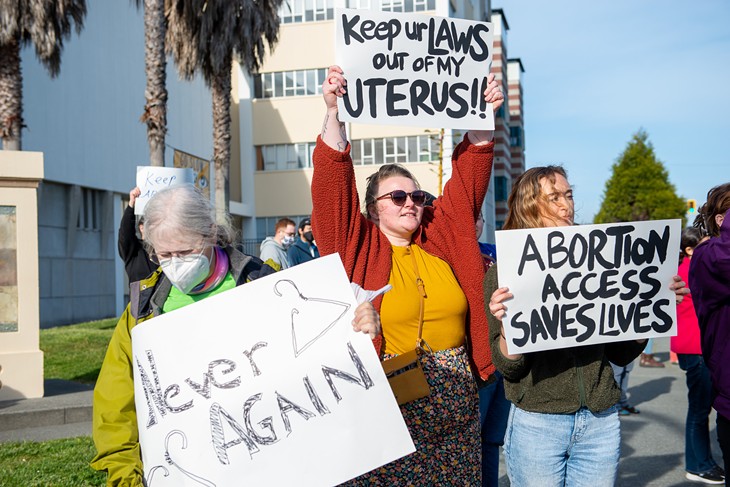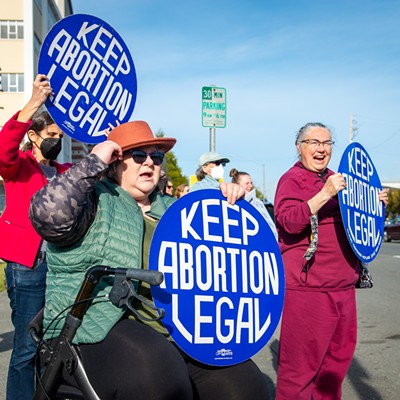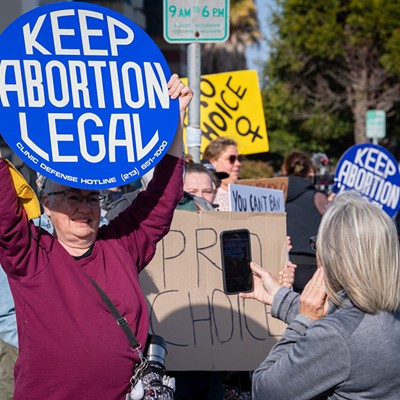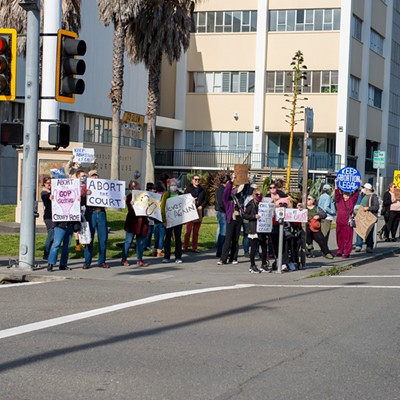News Blog
California Democrats Lean into Abortion Rights as ‘Defining Issue’

- Photo by Mark McKenna
- Erin Sullivan, wearing a pink glove and waving a coat hanger was one of dozens who turned out to support reproductive health at the courthouse on Tuesday.
It didn’t take long for the personal devastation to turn political.
By Wednesday morning, Gov. Gavin Newsom, who is running for re-election this year, had already cut a new campaign ad about “reproductive freedom under attack.” In a tweet unveiling the ad, he framed defeating “anti-choice Republicans” as the “defining issue of the 2022 election.”
As the stark reality has sunk in that the landmark Roe v. Wade decision is unlikely to make it to its 50th birthday, many Democrats are leaning forcefully into abortion rights as a key election issue. With decades of public polling indicating that a majority of Americans believe abortion should be legal in all or most cases, it could be the party’s most potent counterweight in a campaign cycle in which Republicans seem poised to capitalize on voter frustration over inflation and crime.
“Don’t think for a second this is where they stop,” Newsom said Wednesday outside Planned Parenthood Los Angeles, where he raised the alarm that conservatives would also seek to roll back other rights such as same-sex marriage. “Pay attention, America. They’re coming after you next.”
In his remarks, Newsom called for a stronger Democratic counteroffensive on protecting abortion. He slammed Republicans for claiming to be pro-life while opposing policies to provide more support to women and families after a baby is born, previewing a political attack that could soon be coming to swing districts across the country.
“That’s how extreme the Republican Party is in the United States of America. You want extremism? Rape and incest, they don’t even make an exception,” Newsom said. “Wake up, America. Wake up to who you’re electing.”
Democrats, weighed down by sagging approval ratings for President Joe Biden and in danger of losing control of Congress in the November midterm election, have been struggling to find a message that might motivate liberal voters to show up to the polls and persuade moderates to stick with their governance.
Jack Pitney, a professor of politics at Claremont McKenna College, said the reality of a Supreme Court ruling against abortion rights could provide a significant boost. Though warnings about that potential outcome have not historically driven turnout for Democrats while the Roe decision withstood decades of attacks, Pitney said voters are much more alert to loss.
“The issue has moved from the realm of the hypothetical to the realm of the real,” he said.
And it could remain near the top of the news through the rest of the year, with the official opinion expected this summer and then potentially dozens of states passing new abortion restrictions after that.
“It’s kind of like a wildfire, and the burning embers and debris will spread over the electorate for months to come,” Pitney said.
Still, it is uncertain how much of a difference abortion can make for Democrats, who are facing significant political headwinds nationally from pocketbook issues such as spiraling inflation and high gas prices.
While probably not potent enough to shift the balance of power, Pitney said abortion could move the margins in close races with national implications, such as the contests for U.S. Senate in Georgia and Wisconsin. Some Republicans are already planning to push for a nationwide abortion ban should the GOP win complete control of the federal government in the next few years. The ruling, Pitney added, might also help Democrats regain some ground with young voters, who have particularly soured on Biden.
There is probably less of a potential impact in California, where Democrats have nearly maximized their power at every level of government.
Beth Miller, a Republican political consultant, said Californians who are motivated by abortion rights are already quite engaged politically. She is skeptical that it will bring new or infrequent voters the the polls, especially when abortion access is not under immediate threat here.
“The overriding issue in California is the cost of living,” Miller said.
But California Democrats are quickly elevating abortion to the forefront of their messaging anyway, with some even fundraising off the news that Roe v. Wade may be overturned. More than 70 percent of Californians oppose repealing the ruling, according to a poll this year by the Public Policy Institute of California.
Within hours of Politico publishing the draft Supreme Court ruling on Monday night, Newsom and legislative leaders pledged to put an amendment on the November ballot enshrining the right to abortion in the state constitution. Though “not why we’re doing this,” Senate President Pro Tem Toni Atkins, a San Diego Democrat, acknowledged during a press conference Tuesday that she hoped the measure would boost turnout.
During his visit to Planned Parenthood on Wednesday, Newsom agreed that “folks should really be pissed off at this moment. If this doesn’t animate people to get involved…I don’t know what the hell will.”
The greatest impact could come in a handful of swing U.S. House districts, where the Democratic Party is defending vulnerable incumbents or seeking to win back seats it lost two years ago. Anti-Donald Trump fervor among suburban women drove Democrats to major gains in places such as Orange County in 2018, and anger over abortion restrictions may provide a similar motivating force in 2022.
In the Santa Clarita Valley outside Los Angeles, where Republican Mike Garcia won a congressional race by fewer than 400 votes in 2020, his Democratic opponents have repeatedly lambasted the draft Supreme Court decision on social media and in local news outlets since Monday night.
Christy Smith, who lost to Garcia two years ago and is seeking a rematch, attended an abortion rights rally Tuesday evening, posing near a giant replica of a wire hanger with a “keep your policies off my body” sign. She called it a “warning” to Garcia.
Another Democrat challenging Garcia, Quaye Quartey, said in an interview that the draft ruling had created “more of a sense of urgency” around stopping the “Republican onslaught on our democratic values.” He noted that Garcia had signed an amicus brief asking the Supreme Court to overturn Roe and co-sponsored a bill to ban abortion nationally by declaring that life begins at conception.
“We know that he’s dangerous, and this is just another example of how dangerous he is,” Quartey said.
Yet not every Democrat has rushed to embrace the topic, hinting at some of the political nuances that could emerge as the immediate outrage over the draft opinion settles.
Unlike many of her colleagues, state Sen. Melissa Hurtado of Hanford, who faces one of the toughest re-election bids of any legislator this year, has yet to comment on the decision. Since Monday, she has posted on social media about mental health awareness, teacher appreciation and even Star Wars Day, but not abortion rights.
Neither has Assemblymember Rudy Salas of Bakersfield, who is seeking to take out Republican David Valadao in a Central Valley congressional seat with an increasing Democratic voter registration advantage.
Neither Hurtado’s nor Salas’ campaigns responded to interview requests. But both are running in districts where a majority of voters are Latino and white conservatives have traditionally held disproportionate sway in elections because of low turnout.
The PPIC survey found that support for Roe v. Wade was considerably lower among Latinos than other ethnic groups in California — just 64 percent. And while a slim majority of Republicans (54 percent) do oppose overturning the decision, that compares to 77 percent of independent voters and 87 percent of Democrats.











Comments